#integrationist
Explore tagged Tumblr posts
Text
Haven't had a chance to read further yet, but after the rabbits incident, the winged lion starts seriously considering Marcille as dungeon lord material, and I think it's interesting that Kabru hasn't. He knows Marcille knows ancient magic and even observes that she'll probably be recruited as a canary, but he's fixated on Laios as the likely dungeon lord candidate. Blinded by his protagonist aura perhaps
#I'd consider Marcille a deuteragonist tho#tumblr doesn't recognize that and spellcheck suggested integrationist#I guess that is also technically true#kat reads dungeon meshi
18 notes
·
View notes
Text
I saw a tiktok like singlish and naija pidgin are the same thing in different fonts here's a video explaining why that is and I was like "meh, I don't really hear it," but I was scrolling random videos on instagram and had a ??? couple of seconds hearing an asian guy speak what was apparently pidgin before I remembered Singapore exists
#i know there's been asians in Nigeria here and there for time but they tend not to be integrationist enough to speak any of the local langs#linguistics hobbyist
0 notes
Text
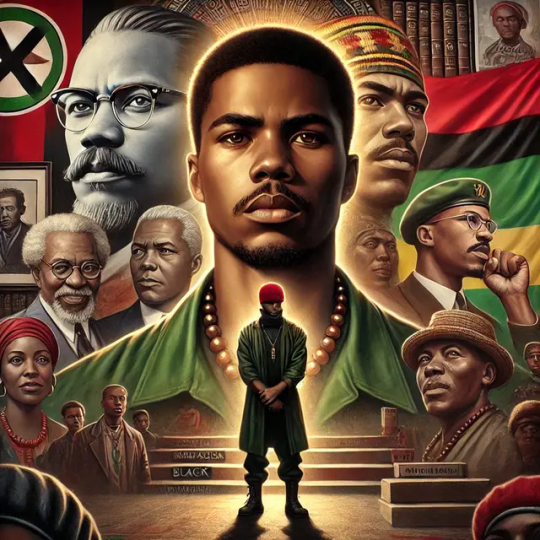
The Hypocrisy of Fake Love for Black Revolutionaries: A Garveyite Perspective on the Betrayal of Our Icons, Leaders, and Ancestors
From a Garveyite perspective, one of the most dangerous betrayals in the Black community is the false admiration for Black revolutionaries, icons, and ancestors. Many Black people praise these figures publicly but refuse to embody their teachings, sacrifice for the movement, or apply their wisdom in daily life.
Marcus Garvey himself experienced this hypocrisy: he was celebrated by millions but was ultimately betrayed by his own people, leading to his persecution, imprisonment, and the destruction of the Universal Negro Improvement Association (UNIA).
This false love for Black revolutionaries is a form of empty hero worship—where Black people:
Wear the names of Black leaders on their clothes but refuse to carry their ideologies in their hearts.
Quote Malcolm X, Assata Shakur, and Garvey but live according to white capitalist values.
Praise the ancestors but continue the same behaviours that kept Black people in chains.
This analysis will explore:
How Black revolutionaries are romanticized but ignored in practice.
The betrayal of Black leaders in their own lifetimes.
How the system benefits from keeping Black leaders as symbols rather than applying their teachings.
The failures of modern Black movements to truly follow Garveyite principles.
How we must break the cycle and truly honour our icons with action, not just words.
1. The Romanticization of Black Leaders While Ignoring Their Teachings
Many Black revolutionaries are treated like celebrities rather than serious leaders.
A. Turning Black Leaders into Symbols Instead of Following Their Actions
People wear Malcolm X shirts but still believe in integration and white validation.
They post Garvey quotes online but refuse to build Black-owned businesses or invest in Pan-African economic power.
They celebrate Dr. King but ignore his late-stage radicalism against capitalism and imperialism.
Example: Malcolm X rejected integration and white liberals, yet today, many of the people who claim to admire him fight for assimilation into white institutions instead of Black independence.
B. The Empty Worship of Black Ancestors Without Change in Behavior
Many Black people claim to honor the ancestors, but still:
Use their resources to enrich non-Black communities.
Reject African traditions and spirituality in favour of white religions.
Teach their children Eurocentric values instead of Pan-African principles.
Example: The same Black people who praise Queen Nzinga and Shaka Zulu will still vote for anti-Black politicians, neglect Black-owned businesses, and refuse to defend their own communities.
Key Takeaway: Garveyism teaches that honouring our icons means CONTINUING their work—not just admiring them from a distance.
2. The Betrayal of Black Revolutionaries in Their Own Lifetimes
Throughout history, many of the same Black leaders we celebrate today were rejected, attacked, or betrayed by their own people when they were alive.
A. How Marcus Garvey Was Betrayed
Garvey built the largest Black movement in history, but many of his own people helped destroy him.
W.E.B. Du Bois and the NAACP opposed him and worked with the U.S. government to undermine the UNIA.
Many Black elites and integrationists mocked his call for African self-rule and repatriation.
Example: When Garvey was arrested on fraudulent charges, some Black leaders celebrated his downfall, showing their loyalty to white power structures over Black independence.
B. Malcolm X and the Nation of Islam Betrayal
Malcolm X risked his life for Black people, but when he started exposing the weaknesses of the Nation of Islam, he was abandoned and ultimately assassinated.
Many of his former supporters refused to stand with him when he needed protection the most.
Example: After Malcolm X was killed, Black people mourned him—but where were those same people when he was alive and fighting alone?
Key Takeaway: Too many Black people only recognize greatness AFTER a leader has died—but real support means standing with them while they are alive and fighting.
3. The System Benefits from Keeping Black Leaders as Symbols, Not Teachers
The white power structure wants Black leaders to be icons, not active ideologies. They understand that:
A dead revolutionary is harmless; a living one is dangerous.
A Garvey shirt is acceptable; a Garveyite movement is not.
Dr. King’s “I Have a Dream” speech is promoted; his speeches about fighting capitalism and imperialism are ignored.
Example: The U.S. watered down Dr. King’s radicalism and now uses him as a symbol of “peace” rather than a fighter against white supremacy and economic exploitation.
Key Takeaway: The system promotes a version of Black history that is safe and non-threatening—true Garveyites must reject this watered-down history and embrace the full revolutionary teachings of our leaders.
4. The Failure of Modern Black Movements to Apply Garveyite Principles
Many modern Black movements:
Focus more on representation in white spaces rather than building independent Black power.
Seek validation from white liberals rather than unifying with Africa and the global Black world.
Celebrate Black icons without practicing self-reliance, cooperative economics, or Pan-Africanism.
Example: Some modern Black activists claim to admire Garvey but spend more time appealing to white-owned corporations for funding than building their own economic power structures.
Key Takeaway: Black liberation can not come through white money, white validation, or white institutions. Garveyism teaches that true power comes from self-reliance and unity among Black people worldwide.
5. How We Must Break the Cycle: Honouring Black Icons Through Action
To TRULY honor our ancestors and revolutionaries, we must:
Practice Pan-Africanism – Work with Black people globally, not just within colonial borders.
Build and support Black-owned businesses – Keep wealth circulating within Black communities.
Teach Black children about REAL Black history – Not the whitewashed version.
Protect Black revolutionaries while they are alive – Not just mourn them after they die.
Reject the trap of white validation – Stop seeking approval from the same system that destroyed our leaders.
Final Takeaway: Garvey warned us: Black people must stop being spectators in their own liberation. If you love our leaders, SHOW IT by continuing their work—not just praising their names.
Conclusion: Time to Put Respect in Action, Not Just Words
If Black people TRULY loved Garvey, Malcolm X, Assata Shakur, and our ancestors:
We wouldn’t be begging for acceptance from white society.
We wouldn’t be spending trillions on white businesses while Black communities remain poor.
We wouldn’t be waiting for white governments to save us instead of uniting with Africa.
True love for Black revolutionaries means:
Practising their teachings.
Building the systems they fought for.
Sacrificing for the future of Black liberation.
As Garvey said:
"We must canonize our own saints, create our own heroes, and elevate our own history."
Words are not enough. The time for REAL action is NOW.
#black history#black people#blacktumblr#black#black tumblr#pan africanism#black conscious#africa#black power#black empowering#black liberation#black revolutionaries#black revolution#self determination#reparations now#Garveyite#Garveyism#marcus garvey
174 notes
·
View notes
Text
Xavier's Walk of Shame

Xavier, the ungrateful bitch, wakes up in an unfamiliar place feeling like shit. Callisto greets him, and in between ill-tempered complaints, she explains that she saved his life after he was robbed and beaten. She even gave up her bed so he could rest up, but for some reason he's hyper focused on how she dressed him.

Callisto correctly thinks it's an improvement, though it's not like she wanted to give her clothes to this misanthrope. After hearing the sacrifices made to save his life, Chuck croaks out some begrudged gratitude then puts on his anthropology hat. Marvelling at the size of the Morlock tunnels, he pays little attention to the fact that he's not loved down here.

Callisto doesn't exactly trust Xavier and refuses to tell him how many Morlocks there are, but freely admits that Storm is the leader. Chuck's rhetoric and outreach skills are as polished as ever, insisting that the Morlocks can't hide forever. Honestly, he's lucky to not get stabbed for that, as a wealthy hidden mutant living in a fucking mansion. My read is that he can't imagine anyone not wanting to be accepted by human society, especially not to the point of making their own.
Their back and forth is interrupted by the news that a Morlock's kids were shot dead. Callisto angrily points to her promise to Ororo, but swears that only goes so far. Xavier has jack shit to say to that. To be fair, he's not at his best but it's not like he just found out about The Morlocks. He has virtually infinite resources and there's more than one way to collaborate on/assist with a better life. Food, medicine, clothes, hygiene products, etc are basics he could provide, let alone the insane technology at his disposal. Even if any of this did stick with him, he ran his body ragged and had to spend years in Shi'Ar space recuperating. It's unclear how much control X-Men have over finances, but they have other resources and are just as aware of the Morlocks' existence. His focus on 'hiding' 'down here' with an uncertain 'future' feels evangelistic yet ignorant of material conditions.
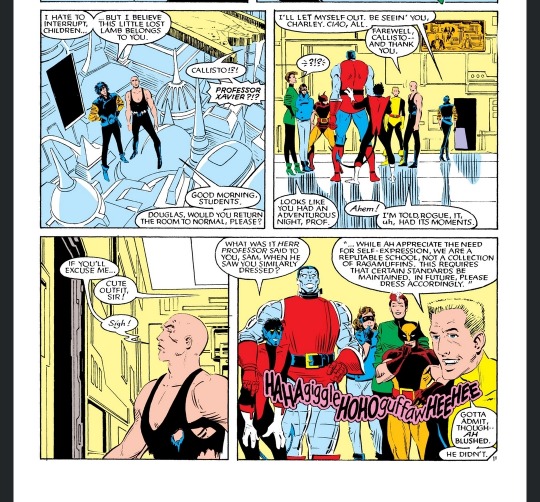
Anyway, she drops him home on that somehow functioning train and they waltz into the mansion together. The X-Men present are surely thinking that Chuck had a wild one and banged Callisto. His vague silence on the matter as he tries to maintain his dignity does nothing but reinforce suspicions. Everyone remembers him telling Sam off for dressing like a punk and they have a good laugh. He never really got a chance to clear this up and Chuck/Callisto have had several periods of closeness. I think the X-Men believe the two are exes or something. No shame there, it's just funny.
I've always felt that The Morlocks are a missed opportunity. They're very much the anti X-Men in every way. Attractive/ugly, rich/poor, integrationist/secessionist, heroic/antisocial. I suppose the last one is the kicker, as they're not a hero team and they're given super unsympathetic practices like spouse kidnapping and fights to the death. All the dichotomies count against them getting focus, except when they're being massacred. I daresay they were invented without considering exactly how their culture and survival works. Several hundred people need a LOT of food and space, they shit a lot etc. Having a magic healer solves some of the problems of living in a sewer but definitely not all. Besides, Healer is not immortal or even especially healthy himself.
I give points to the Hivemind for recognising the cultural overlap with Arakki society and putting it to page. They even organise as part of the NYX political coalition but sadly that book got cancelled. The traditional Morlock position undercuts a lot of X-Men means and ends, likewise Magneto's solidarity and emancipation mission. I wonder if The Morlocks show up in Xavier's The Dawn of Homo Superior. We haven't seen much theory in-universe but I think 'what about The Morlocks?' should be a question for any political process. Alex Summers' 'M word' speech explicitly throws them under the bus, for example. Further, the good/evil divide of the early days is superceded by class politics. In a chicken/egg scenario - do they choose to live in a sewer because they're outcasts or are they outcasts because they live in a sewer? Realistically neither, but Xavier doesn't have the frame of reference to unpack that.
Ironically, many Morlocks rejected Krakoa but opted for accepting its bounty to live in a gated community in Arizona. They're not a homogeneous group, but the suggestion that of course they secretly desire upper middle class country club life is a little odious. Maybe it was a reason to avoid expanding on Morlock culture, though the era did check in on various Morlocks here and there. They haven't forgotten the Mutant Massacre or John Greycrow's role in it, and how could they be expected to with its architect sitting on the ruling council? Even in paradise they get shit on. Although, NYX left them in an interesting place - hopefully someone picks that thread up again.
#x men#x comics#charles xavier#professor x#callisto#morlocks#cannonball#healer#nightcrawler#marvel#comics#mutant massacre
26 notes
·
View notes
Text

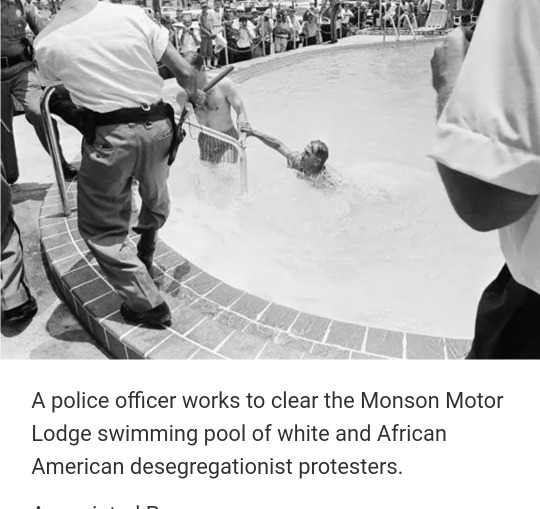



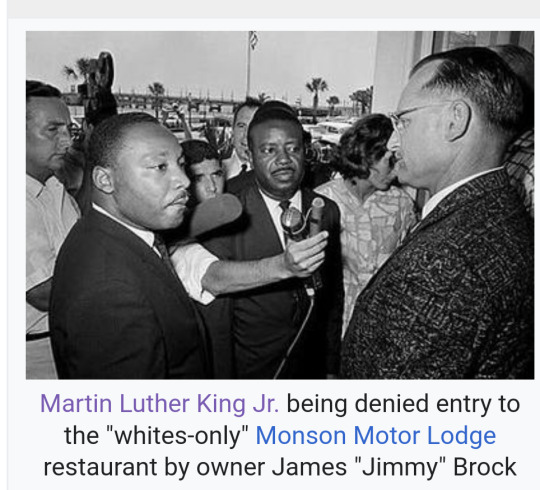



When a group of white and African American integrationists entered a segregated pool at the Monson Motor Lodge, manager James Brock, left, poured acid into it, shouting "I'm cleaning pool," on June 18, 1964, in St. Augustine, Fla.
#black lives matter#black tumblr#black history#black literature#black excellence#black community#civil rights#black history is american history#civil rights movement#black girl magic#equal#equal rights#black history month#american#american history#world history
542 notes
·
View notes
Text
loving all the love for Severance but you guys are gonna apply what you’ve learned about “people not parts” to multiple systems and plurality and alters, right? you’re going to recognize the inherent trauma in integrationist treatment plans, right? you’re going to believe that everyone with a “little life” doesn’t deserve to get turned off, right?
right?
20 notes
·
View notes
Text
Maybe one day I’ll actually come back to the fandom, but my undergrad honors thesis is on Black American Existentialism because of mafia 3. I wish I was kidding but I am not. Mainly I am looking at American vs European, and then narrowing down specifically to existentialist thought within the Black experience post-1900; if anyone’s interested in my needless rambling let me know! But onto the game itself.
If I had the time, I’d really like to do a comparison between Lincoln and Father James’ moral philosophies since I actually have analyzed both a decent amount (albeit my moral philosophy knowledge is to be expanded lmao). There’s something so… counterintuitive about Lincoln’s borderline-determinist belief of himself versus FJ’s desperation to prove free will as a net positive rather than a net negative (but ultimately failing— “we are a cruel and wicked people”).
I think what caused the two to divide so much is that Linc so deeply wants to belong as well as be an individual, but believes himself to be forever alienated; FJ believes so deeply in choice that he cannot fathom why Lincoln chooses to do the wrong thing so consistently, especially when it hurts him too. Sign of the Times really shows that division too with the hidden sunset scene, where Lincoln only sees the greed and decay of the city when Anna focuses on the beauty and FJ is annoyed by Linc’s “choice” to see the worst of New Bordeaux.
Anna honestly should’ve stayed alive and played a bigger role in the story tbh, she might’ve been able to help the two see eye-to-eye and it would’ve been a pretty interesting philosophical conversation with the added context of the Civil Rights movement (both integrationists and Black Power activists held existentialist views, but to different extents and interpretations). And idk John would’ve been there too I guess. He’s got his own moral philosophy but just like the American flavoring of existentialism, it’s kind of fluid. I’ll save it for another post 🫡
11 notes
·
View notes
Text
Fascism
Ultranationalism- interest in one state above all others "Make America Great Again much?"
Hierarchialism- belief that certain people are placed above others, (Alpha males vs. Tradwives, Christians vs. Muslims, race hierarchy etc.)
Dictatorial leader- Trump duh.
Centralized autocracy- Trump and the Trump family.
Cooperation of Corporate and State power- crony capitalism under Trump, Biden is pro-labor, corporations HATE that!
And in addition to also being anti-union and VERY anti-immigrant which are also typical of fascist governments. And they LOVE to twist the definitions of words as you have been doing.
@gloomwalkers I'm talking to you, this is your education time. These are characteristics of fascism. We don't care if Biden's whole family goes to prison, as long as it is for ACTUAL crimes, he is just there as a wall against a fascist takeover. Leftists tend to be globalist, humanitarian, egalitarian, ideological, democratic, integrationist and anti-corporate. The OPPOSITE of fascism in nearly every way.
55 notes
·
View notes
Note
this is a stupid question but I a promise I’m asking it in good faith. What do you think of the idea that jazz is ‘America’s classical music?’
I have an old joke about this, which is that the US had to eventually claim jazz was its ‘classical music’ because for 200 years until the 20th century it produced absolutely no classical music of any worth, even in retrospect, and when finally US born composers of worth started showing up all of their work would have fallen strictly under the concept of ‘degenerate’ atonal etc music. They also had a disturbing tendency (by far far not universal, especially with some of the big names) to be gay ass socialists if not communists.
The conception and framing of jazz as ‘America’s classical music’ arises at a particular point in the musics history—really the 50’s, given intellectual weight by Ralph Ellison—when the music was rapidly losing it’s status as massively *popular* music, but also distinctly shuts off and rejects its continued development as art music. So both historically and in sound, aside from it’s retroactive claim on music it had previously disparaged, banned, criminalized a la Nazi degenerate diktat, it’s really fixated on a very small sliver of the musics history that was already becoming a museum piece because it was transitional.
What I mean is that infamously in Ken Burns jazz documentary he really does just stop talking about the music with the arrival of the 60’s to do a living hagiography of Wynton Marsalis who dismisses especially free jazz, self-determination music, jazz rock, fusion etc as ‘bullshit.’ Marsalis to this day continues to advise younger musicians that to keep the music alive, they should look back to and learn and develop on the ideas of say Monk—not realizing that that already happened, with Andrew Hill and Cecil Taylor. He envisions and enacts a perpetual generally polite pro-US apologetic integrationist bop that ‘advances’ merely in terms of recapitulated harmonic advances a la European concert music.
That is to say, as a claim it’s irrelevant to the vast majority of the music and musicians, both before and after the claim was made. The music that’s explicitly made in the name of that conception very rarely gets defenders outside of the subscribers of the New Yorker who go to Lincoln Center; you’re unlikely to ever see it posted or mentioned. As a conception it can be safely regarded as a fundamentally racist Eurocentric USAmerican appropriation. (Albeit, one so prevalent that it informs most US conservatories historical teaching…I’ve seen videos made by several young men coming out of conservatories recently that have seriously claimed ‘Sun Ra was apolitical’.)
7 notes
·
View notes
Text

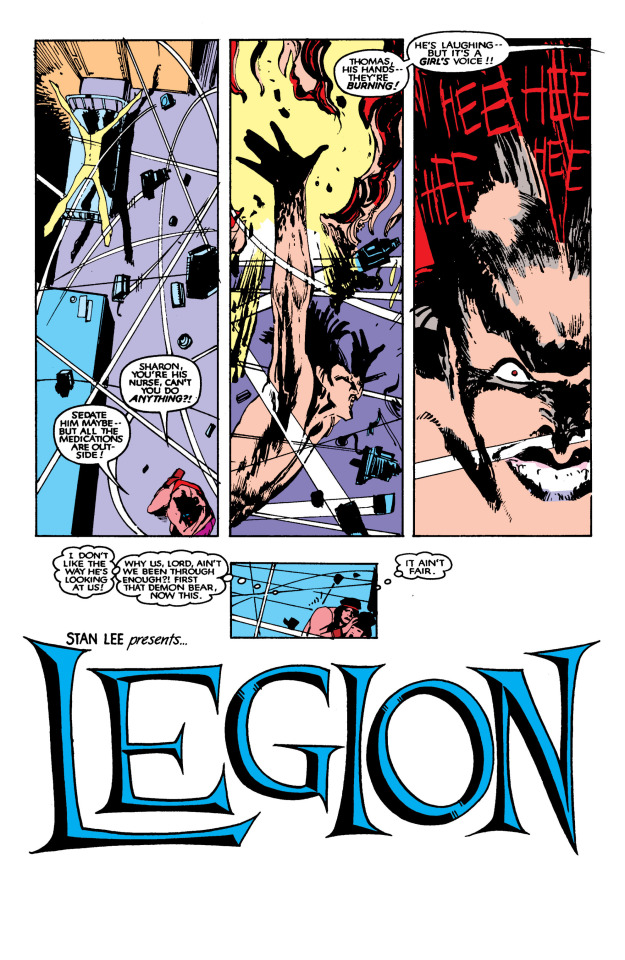
New Mutants Classic vol. 4

I've been nice about this, but I find it actually impossible to believe that Charles Xavier, a disabled liberal rights activist who's campaigning for the equality of people oppressed due to a genetic abnormality, is not intimately aware of the history of eugenics as pertains to cognitive disabilities. Further, I find it very hard to believe that Charles Xavier spent time in an Israeli psychiatric hospital, started a relationship with a schizophrenic Dachau survivor, and didn't at all learn the history of schizophrenia as a Nazi construct or incorporate it into his worldview and activism.
It feels like an out of character limitaiton brought on by Claremont's own ignorance, unfortunately. Xavier would be all about this shit. Claremont's Uncanny precedes it, but one must imagine Charles Xavier fiending on The Politics of Disablement (1990) and adopting social model, deinstitutionalist principles, because his beliefs as an integrationist already align with this. One must imagine him fiending on On Our Own: Patient Controlled Alternatives to the Mental Health System (1978).
One must imagine he knows what normalization is, who Wolf Wolfsenberger was (because he has a very funny name), and the theory of social role valorization, because it is what he does for the mutants.
Xavier's specific attitudes regarding disability are in contradiction to the character's wider worldview, in a way that feels accidental and is not contextualized or deconstructed because of the writer's pre-existing understanding of the subject matter.
The reason I think Xavier's characterisation stands out as egregious here is that, well, as - again - a disabled activist, he would have access to these concepts as they are directly about him. He is also a disabled public figure who's been on TV to support adjacent causes; he would've been reached out to.
I just do not think that, if written with hindsight, he would be oblivious to the 1970s disability rights movement embodied in organizations like The Union of the Physically Impaired Against Segregation, or the deinstitutionalisation movement.
I'd take it even further: there is no actual reality in which I believe Xavier, a psychic and again activist for people marginalized due to non-normative genetic presentations, is not familiar with the psychiatric survivor movement and niche anti-psychiatry discourses. There's just no way that this isn't a part of his life if he is written by somebody who knows these things exist and can incorporate this knowledge into their writing.
Absolutely everything I've just said applies doubly to Gaby Haller as a schizophrenic Holocaust survivor. I know she is magicured by Xavier immediately, but how does something like that not consume you, especially when your son presents similarly? Accommodating for severely psychiatrically ill Holocaust survivors was a systemic reality and discourse of Israeli politics continuing into the 1970s, likewise the emergent presentation of psychiatric illness among the children of Holocaust survivors. It feels irresponsible to play in this subject without truly committing to doing one's homework.
All of these movements existed prior to and in the 1970s.
Claremont just never learned about them, and it frustrates me because brooo we could've had such a better story if he did, y'know?
5 notes
·
View notes
Text
wip wednesday—17/10—“all i need”
thank you for your comments!! here are my twenty four lines for “all i need” for @wizisbored @hurricanebreeze @quietly-sleeping @kallisto-k @enigma-the-mysterious @1attheedge @twyrewolf @post-and-out :
“So, you speak French,” Vinda mused.
Leta smiled without mirth, settling into one of the damask velvet chairs. She didn’t bother to arrange her skirts; today, Vinda was wearing Grindelwald’s uniform, and keenly aware of the politics of clothing choice, Leta decided she would frame the lack of trust in her as a small rebellion.
“Perhaps not born from the same reasons as you, as a tongue given to me freely,” she said, “because the man who tore apart my mother’s life was French. I don’t think I had one lesson with my governess where I wasn’t made to feel like something half in their world, when really, my combined lineage forms a richer blood than many others.”
Better left unspoken—she hated half of it, and much of herself. In the end, rainy England had become her home, and she’d returned from those travels in Senegal after her graduation with no greater understanding of the truth of her past.
Instead, she had decided to choose the home that still cradled her, and that had been England. Most individual wixen below the aristocratic pureblood class were bemused at the Muggle governments’ and companies’ colonial activities, a smaller minority speaking against it when it came to either integrationist or anti-Statue debate. And she had found herself one of them until Grindelwald’s cause had come knocking.
No one had offered her solutions. No one had proposed there were any easy ones. But tearing down the old system—a system that often refused to question its traditions and what exactly they were built on, that used its separatism as wilful blindness?
With a history like hers, she couldn’t look away any longer. And if the path ahead was dark, she would face it with eyes wide open, supported by the weight of her name.
Vinda settled on the sofa opposite, propping one elbow up on the armrest, stretching out with her riding boots kicked up onto the weak red cushions.
“There is no room for hate in the upper echelons. That implies you might be held,” she said in her rich French accent, smiling, “accountable to others, which is simply not necessary. With enough power and wealth, you simply can choose not to. See, I am pleased you’re here. I was afraid it would turn into somewhat of a boy’s club around here, and you know how men can twist a revolution. Not that there is anything essentially soft about a woman's touch either, no—we have nothing essential to us at all. I refuse to be a man’s opposite. You must understand.”
10 notes
·
View notes
Text

Sarah Ann Major Harris Fayerweather (April 16, 1812 – November 16, 1878) was an activist, abolitionist, and school integrationist. She attended Prudence Crandall’s Canterbury Female Boarding School, the first integrated school in the US.
She was born in Norwich, Connecticut. The daughter of William Monteflora Harris and Sally Prentice Harris, both of whom were free farmers, she was the second oldest of twelve children. She was raised in the Orthodox Congregational Church of Canterbury.
In September 1832, she requested admission to the Canterbury Female Boarding School. In a letter to William Lloyd Garrisons newspaper The Liberator, Crandall recalls Sarah’s visit: “A colored girl of respectability – a professor of religion – and daughter of honorable parents, called on me sometime during the month of September last, and said in a very earnest manner, ‘Miss Crandall, I want to get a little more learning, enough if possible to teach colored children, and if you will admit me into your school I shall forever be under the greatest obligation to you. If you think it will be the means of injuring you, I will not insist on the favor.” After a brief deliberation, Crandall admitted her to the school and refused to expel her when the parents of most of the other attendees withdrew their daughters.
She married George Fayerweather, Jr. (1833). They moved to New London, Connecticut in 1841 before moving to Kingston, Rhode Island, in 1855 to raise their eight children. They supported abolitionism and racial equality, she joined the Kingston Anti-Slavery Society, attended antislavery meetings held by the American Anti-Slavery Society in various cities across the North, maintained a correspondence with her former teacher Prudence Crandall and former enslaved and abolitionist Frederick Douglass, and subscribed to The Liberator. She maintained an active church life, joining the Sunday school class at Kingston’s Congregational church. #africanhistory365 #africanexcellence
3 notes
·
View notes
Text
Setting Blurbette:
As some of the more militant Cordons Sanitaire began to plan for their future uprising, the more...insufferable elements of the proto-WCOF (primarily of the environmental extremists) were shuffled about to fronts that would suffer little-to-impact by being there.
They were primarily dumped in the Cordons on Long Island and Martha's Vineyard, and built their powerbase there.
Continued snubs and snafus between them and what would become the WCOF would result in the de facto expulsion of the "Green Consensus" prior to the Cordon Rebellion following Ignacio Rotthey's death.
While they were not an active participant in the Cordon Rebellion and JANISSARY, the Green Consensus made their debut on the world stage with their expeditions to the Amazon, Galapagos Islands, and Montserrat. Their possession of those territories was (begrudgingly) recognized by all signatories of the Treaty of Las Vegas.
They developed a habit of claiming new territory following environmental disasters, to take advantage of the decrease in population.
They also developed three key subfactions: The Integrationists believe in can return to being another facet of the environment, and are anarchy-primitivist*. The Deep Green aren't as conciliatory regarding the human species, and ultimately wish for an environment "cleansed" of humanity's impact . The Blue Subconsensus was established to focus on the Earth's bodies of water, and may or may not be responsible for the development of Kaiju.
Prior to the 2800s, the Big 3 and the Consensus had an on-again off-again relationship, with the "Greenies" viewed as glorified park rangers and hippies. Consensus enclaves were allowed to be established in the Martian and Venusian terraforming projects.
After the Crystalline War, and the Earth's nuclear bombardment, elements of the Green Consensus have gone a little...bonkers.
Most of the Integrationists have gone underground and are riding out the Earth's healing. The Deep Greens and Blues have become more and more vocal. And militant.
As the Big 3 have drawn up plans to recolonize the Earth once the fallout is fully cleared, the Green Consensus have sent warnings that those responsible for nuking the Earth will not have an easy time reestablishing a presence on the home world of all life in human space.
They've also begun conducting hostile actions on Mars and Venus.
6 notes
·
View notes
Note
✨for thralls, saltwives, and wildling captive brides, please
I don't actually have lots of headcanons (I am notoriously bad at worldbuilding, sorry!) so I'll just dump some thoughts on canon I more or less recently had re: saltwives
I think it's really interesting how Victarion does not seem to have a distinction between saltwife and rock wife in his internal monologue and maybe to have been monogamous. I wonder if it's an example of him taking ironborn tradition more literally than others do and if it's something that had an evolution in time, from being meant to really be a defacto marriage to being more of an excuse to have concubines/lowborn mistresses in a more violent version of what happens on the mainland
I think salt children take the name of the father! There's varying opinion in the fandom but I prefer it this way. This because I enjoy to headcanon random people who have canon names as salt children for fic purposes
I imagine this custom was super politicized the 300 years of yo-yoing relations with the iron throne and it can be seen in more integrationist houses having more of an Essosi influence because they avoided raiding in Westeros to try to keep the peace
Oh wait this is actually an headcanon/a dream fic I will write someday lol but: I really love the idea that the salt wife of the Codd man who Theon meets at Moat Cailin does end up naming her son Theon out of gratitude for getting him killed lol I so want to write that meeting I really wish GRRM had given some salt wife some sort of speaking part in canon
5 notes
·
View notes
Note
🔥 on... hmm... FMAB?
ok idk if this is still really the case but there was a while when the fandom loved to talk about how super cool and leftist fmab was and i just think that's not true.
like fmab has really, uh. weird racial politics. like how miles is sort if propped up as some kind of bridge between amestris and ishval that is uniquely placed to mend the divide (the divide in question: an actual genocide) just because he's mixed amestrian-ishvalan. and then there's the fact that there's only 2 major ishvalan characters and one of them is miles, who as i mentioned is mostly lauded for being mixed, and the other one is scar who literally doesn't have a name.
in general fmab comes really hard down on integrationist verging on assimilationist notions. i am not expecting a shounen anime to be decolonial i pwommy i just get annoyed when people talk about it like it is because it's. Not.
5 notes
·
View notes
Text
Happy Civic Nationalist Day!
Dr. Martin Luther King Jr. is often celebrated by civic nationalists, who champion a vision of nationalism centered on shared values, civic participation, and equal rights for all citizens, regardless of their background. Civic nationalism is contrasted with ethnic nationalism, which defines national identity in terms of ethnicity, heritage, and bloodlines.
King's call for unity and his pursuit of a society where people are judged by the "content of their character" align closely with the ideals of civic nationalism. This philosophy is inclusive and seeks to build a national identity based on common civic values and political principles, rather than on race, religion, or other innate characteristics.
Civic nationalists draw on King's ethos to advocate for a society that embraces diversity but unites under the banner of shared values and collective aspirations. They see King's legacy as a guiding light for how a nation can come together to work toward common goals, ensuring that all citizens are afforded the same opportunities and rights under the law.
King's vision and civic nationalism both promote the idea that every individual has something valuable to contribute to the fabric of the nation, and that the strength of a country lies in its ability to transcend differences to find common ground in shared ideals and the pursuit of a greater good.
What Happened To King’s Message Centered Around Civic Nationalism?
Well, we stopped judging based on the content of character. We shouldn’t be entangling the movements of separatist, with movements in f integrationists. Only the latter is truly a civil rights movement. Dr. Martin Luther King Jr.'s famous words, "I look to a day when people will not be judged by the color of their skin, but by the content of their character," seem to be overshadowed by the actions of leftist movements today. Movements associated with regressive forms of internationalism, such as Black Lives Matter (BLM), the institutionalization of and applications of both Critical Race Theory (CRT), and Diversity, Equity, and Inclusion (DEI) initiatives, are also a source of concern for scholars because they are created by and nurture environments that create more collective narcissists, and that stands in stark contrast to the individual character assessment King championed. In fact, King would say this “content of character”, we should judge each other on!
These scholars strongly condemn the tendency of these movements to prioritize group identity in a way that can diminish the importance of individual merit and character. They argue that this shift towards group identity as the primary lens for judgment is not only a deviation from but a direct contradiction to King's principles. The unintended consequence can be a form of reverse discrimination, where individuals are assessed more on their group affiliations and less on their personal qualities and actions.
King's vision was clear in its pursuit of a society where the individual's character reigns supreme. Scholars who identify collective narcissism within leftist ideologies insist that any excessive emphasis on group identity over individual character is a misstep away from the future King aspired to create. But does one need to know that collective narcissists wouldn’t think they overemphasize race?
They lack the insights, and self awareness necessary. This is where a society needs to judge to raise that awareness and insights, necessary. They lack the will and sometimes ability to do it themselves. Start judging them, as this urge to do so is really a clear recommitment to a society that esteems individuals for their personal merits, moral character, and unique contributions, irrespective of their group identities.
The dialogue propelled by these scholars is not merely academic; it is an assertive call to action. It serves as a reminder that justice should be rooted in the inherent value of each person, reflecting the essence of King's teachings on equality and fairness. Heeding King's vision implies that content of character is paramount and healing from the wounds of collective narcissism is crucial.
So ending the racist wars by not promoting the regressives in anyway that may lead to racial trauma inflicted on anyone, let alone themselves. They do self inflict trauma because a society that truly honors King's legacy would be one where judgment is passed not based on collective identities but on whether one is engaging in collective narcissism or upholding the intrinsic values of character and individual dignity, will be traumatic to them, but not to most.
Let’s go back to MLK’s dream and tell the regressive politicians and remove them from power, permanently! Not racistly, or regressively, by over focusing on or solely on the white collective narcissisms. Universal or not at all!
1 note
·
View note